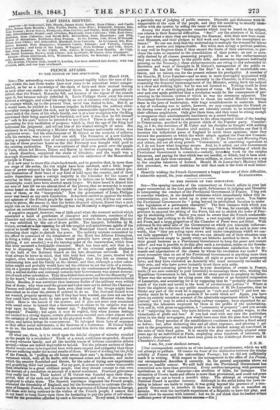TO TUE EDITOR OF THE SPECTATOR.
SIR—The opening remarks of the commentary on French affairs in your last paper recommend, in the best possible spirit, forbearance in judging and liberality in interpreting the conduct of the Provisional Government of k ranee. I beg you to consider whether, in the detailed criticisms which immediately follow this re- commendation, you have acted up to your own very proper canon. You blame the Provisional Government for " going beyond its provisional function to under take legislation of a permanent character." The first instance with which you support this censure is not felicitous. You say, " It was, for example, within its province to suspend thenitting of the Peers, but not to abolish the order of Peer- age by abolishing titles. Surely you must be aware that the French nonheredit- ary Peerage had nothing to do with titles: a vast majority of titled persons were not Peers, and a largtproportion of the Chamber of Peers were not titled. With reference to the other acts of the GOvernment on which you comment unfavour- ably, such as the reduction of the hours of labour, may it not be said in your own words, that " they are acting upon views and under compulsions which we can- not fully appreciate"? Yet even what we can already see of their situation may well be conceived amply to justify every act hitherto ascribed to them. Is it not their grand business as a Provisional Government to keep the peace and restore order? and was it possible to do this after such a revolution, unless on the founda- tion of a compromise which should afford some immediate satisfaction to the de- mands and expectations of the classes by whom the revolution was made ? We must remember that no act of the Provisional Government is anything more than provisional They very properly disclaim all right or power to make permanent laws; and they have convoked an Assembly who must necessarily reconsider all their acts, and who have power instantly to set those acts aside.
The general colouring given by you to your description of events in France, tends (I am sure contrary to your intention) to encourage those who, wishing the Republican Government to fail, look out for every pretext to prophesy its failure. Where was the necessity for citing some idle rumour of an intended resignation of Lamartine, and accounting for it by supposing that he "probably discovers too much of the rude and sordid in the work of revolutionary politics "? Where is there the slightest sign in any public manifestation of M. De Lamartine, that he thinks any part of the work he is engaged in "rude and sordid "? and how un- worthy must he be of such a position if he could think so? Again, you have given an entirely mistaken account of the admirable experiment which " a leading journal," and it may be added a leading railway company, have organized for as- sociating the labourers employed by them in the profits of the undertaking. You call it, with great exaggeration, a " community of property "; and you accuse it of "subjecting the men, who have hitherto counted on regular wages, to the vicissitudes of profit and loss." If you had read with any care the particulars given in the daily newspapers, you would have seen that the plan does nothing of the kind. Every member of the establishment continues to receive a fixed salary as before; but, after deducting this and all other expenses, and allowing per cent to the proprietors, any surplus profit is to be divided among all concerned, in the ratio of their fixed gains. It is exactly the plan successfully adopted some years ago by an individual at Paris, employing some hundreds of labourers, M. I..wlaire • descriptions of which have been given in the Edinburgh Review and in
and
Journal.
[Our correspondent convicts us of two instances of carelessness, which we will not attempt to palliate. Of course we knew of the distinction between the titular nobility of France and the unhereditary Peerage; but we did not sufficiently mark it in writing. With respect to the arrangement in the office of La Prase, our correspondent describes it correctly. In the general arguments above we cannot so readily concur. We still hold that the Provisional Government has committed acts more than provisional. Evety needless tampering with permanent institutions is of that character—the abolition of titles, for instance. The alienation of Crown lands and effects is more than provisional, and could not press so urgently as not to brook a month's delay. The attempt at swamping the National Guard is another instance. Although in the strict letter the laws re- lating to labour are liable to repeal, it was going beyond the province of a tem- porary Government to interfere in them so widely and with so manifest an animus. We wish the inevitable experiment of a Republic to have fair play, and should view its success with interest: but we do not think that its leaders evince sufficient power of control to insure success.—En.]


























 Previous page
Previous page